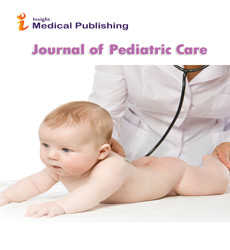Eating Habit and Related Disorder in Adolescence
Nehal A. Allam
DOI10.36648/2471-805X.21.7.e006
Department of Pediatric, Faculty of Nursing, Ain Shams University, Cairo, Egypt
- Corresponding Author:
- Nehal A.Allam
Department of Pediatric, Faculty of Nursing , Ain Shams University, Cairo, Egypt
E-mail: nehall61@yahoo . com
Received date: July 02, 2021; Accepted date: July 16, 2021; Published date: July 23, 2021
Citation: Allam NA (2021) Eating Habit and Related Disorder in Adolescence . J Pediatr Care Vol. 7 No.3:e006 .
Editorial Note
As teenager body is as yet developing, it's fundamental that they eat sufficient great quality food and the right sorts to meet your energy and nourishment needs. Being a teen can be fun, yet it can likewise be troublesome as their body shape changes. These actual changes can be difficult to manage in case they aren't the thing that are anticipating. There can be pressure from companions to be or look a specific way and this may influence the food varieties you eat. It's anything but a happy chance to crash diet, as they will not get enough supplements, and teen may not arrive at your maximum capacity.
Following a reasonable, even eating regimen is a greatly improved alternative, both for the time being and in the long haul. they'll start to become more self -reliant as a teenager and make their own eating choices. They 'll spend time with their buddies or work part-time to afford the things they want. Because they are still developing, they must take extra precautions to ensure that they obtain enough of certain vitamins and minerals in order to feel good and stay healthy.
An eating disorder causes substantial disruptions in eating behavior, as well as related thoughts and feelings. They have a strong desire to be skinny as well as a morbid dread of gaining weight and losing control over their food. Eating disorders can lead to major physical and mental health issues. They aren't a way of life decision. Eating disorders are treatable, and the earlier they are addressed, the better the recovery. Families and friends are frequently in need of support and assistance, and in the treatment process. A physical examination is required to rule out any medical issues that may occur as a result of the illness. It's also critical to have accurate knowledge about your diet and good eating habits, as there's a lot of inaccurate or misunderstood information on food and nutrition available. Talking with a professional therapist is essential for changing their eating disorder -related beliefs, feelings, and behaviors, as well as dealing with stressful life events such as marital problems, school issues, and other issues. Eating disorders, such as anorexia nervosa, bulimia nervosa, and binge eating disorder, are psychological conditions characterised by significant alterations in eating behavior. Anorexia nervosa is a condition in which a teen refuses to maintain a healthy weight. Bulimia is characterized by binge eating episodes followed by compulsive actions such as vomiting or the use of laxatives to eliminate food from the body.
Helping older children and teenagers cope with life demands requires a strong sense of identity and self-worth. They can do the following: Assist them in developing efficient coping mechanisms. Encourage children to express their goals and needs, make decisions (and deal with the consequences), and pursue interests in which they excel. Teach them that saying "no" is OK. Encourage them to speak up if they believe they have been treated unfairly. Assist them in becoming more critical of the pictures and messages they see on television and social media.
Open Access Journals
- Aquaculture & Veterinary Science
- Chemistry & Chemical Sciences
- Clinical Sciences
- Engineering
- General Science
- Genetics & Molecular Biology
- Health Care & Nursing
- Immunology & Microbiology
- Materials Science
- Mathematics & Physics
- Medical Sciences
- Neurology & Psychiatry
- Oncology & Cancer Science
- Pharmaceutical Sciences
